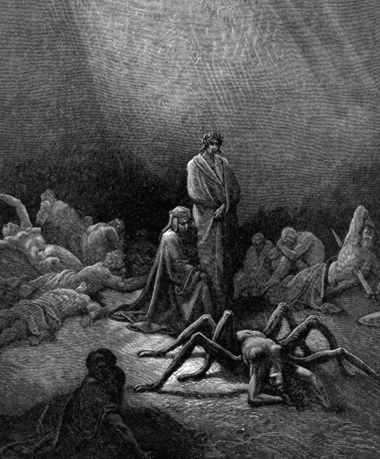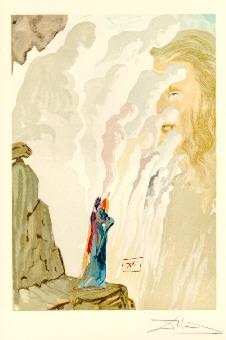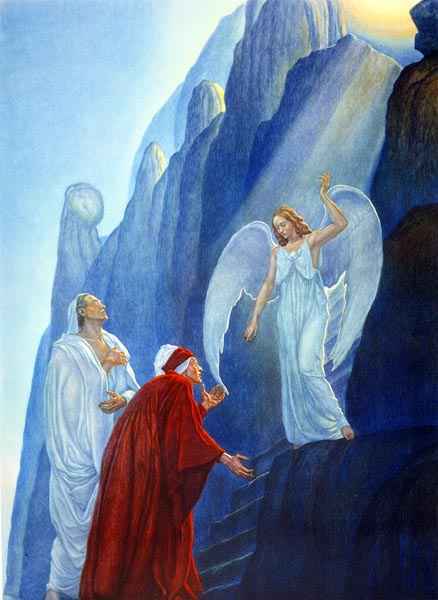 |
 |
 |
|
|
|
|
 |
 |
 |
|
|
|
|
| PURG12 |
|
|
|
|
| ........... | ....... G.GUAITA |
................................. H.W.LONGFELLOW |
...... .D.ALIGHIERI |
....... ... | ....... |
| 1
|
An
pària
mè
i
duj
bö ch'ién sùta 'l zùu, i andàva mi e cul'ànima carià, fin quànd l'è parmetìmlu al mè maèstru. |
Abreast,
like oxen going in a yoke, I with that heavy-laden soul went on, As long as the sweet pedagogue permitted; But when he said,
"Leave
him, and onward pass, Upright, as
walking wills
it, I redressed |
Di
pari,
come
buoi
che vanno a giogo, m'andava io con quell'anima carca, fin che 'l sofferse il dolce pedagogo. |
| 4
|
Ma
quànd
l'ha
dìmi
:"
Làslu dès, distàcti; che chi cunvén cun la véla e i rëm, püsè che 's pöl pusànd, fè 'ndè la bàrca"; |
Ma quando
disse:
«Lascia lui e varca; ché qui è buono con l'ali e coi remi, quantunque può, ciascun pinger sua barca»; |
|
| 7
|
mi
m'àus
sü
drit
e
i marc' adès nurmàl cun la parsòn'a; ànche se i mè pensé rastàvu ancù 'ncürvà e fàcia 'n tèra. |
dritto
sì
come andar vuolsi rife'mi con la persona, avvegna che i pensieri mi rimanessero e chinati e scemi. |
|
| 10
|
Iéra
stacàmi
e
vulantéra
andàva près al maèstru, 'n si so pas, e nuj mustràvu d'èsi vnì tant pü ligér. |
I
had moved on, and followed willingly The footsteps of my Master, and we both Already showed how light of foot we were, When unto me he
said: "Cast
down thine eyes; As, that some
memory may
exist of them, |
Io m'era
mosso, e
seguia volontieri del mio maestro i passi, e amendue già mostravam com'eravam leggeri; |
| 13
|
E
lü
l'ha
dìmi:"
Zbàsa
i öc' an tèra; ta vnirà bon, par fè tranquìl la vìa, che 't vàrdi bén 'ndùa l'è che 't pòzi i pé". |
ed el mi
disse: «Volgi
li occhi in giùe: buon ti sarà, per tranquillar la via, veder lo letto de le piante tue». |
|
| 16
|
Mè
'nsi
làstri,
parchè
memoria
i rèsta, ad cuj ch'ién lì sutrà, i tòmbi 'n tèra figüra i pòrtu ad quànd che iéru viv, |
Come,
perché
di lor memoria sia, sovra i sepolti le tombe terragne portan segnato quel ch'elli eran pria, |
|
| 19
|
e
dzùra
lur
turnùma
sémp
a piànzi parchè 'ndrén an pìa ricurdànsa , che mèc la tùca 'l cör a cuj gentìj; |
Whence
often there we weep for them afresh, From pricking of remembrance, which alone To the compassionate doth set its spur; So saw I there,
but of a
better semblance I saw that one
who was created
noble |
onde
lì molte
volte si ripiagne per la puntura de la rimembranza, che solo a' pii dà de le calcagne; |
| 22
|
cuzì
iù
vist,
ma
'n
fùrmi tant migliùr da cul'àrte divìn'a figürà, al piàn dla strà che 'l gìra antùrn al mont. |
sì
vid'io
lì, ma di miglior sembianza secondo l'artificio, figurato quanto per via di fuor del monte avanza. |
|
| 25
|
Vidìva,
da
na
part,
la
creatüra pü nòbil 'd tüti i àuti, giü dal cél caschè mè 'n fülmin, mè na bàla 'd föc. |
Vedea
colui che fu
nobil creato più ch'altra creatura, giù dal cielo folgoreggiando scender, da l'un lato. |
|
| 28
|
Vidìva
'l
Briaréo
trapasà, da la frècia divìn'a, urmàj lì réid, peizè 'nsla tèra cun al corp a zlà. |
I
saw Briareus smitten by the dart Celestial, lying on the other side, Heavy upon the earth by mortal frost. I saw Thymbraeus,
Pallas
saw, and Mars, I saw, at foot of
his great
labour, Nimrod, |
Vedea
Briareo, fitto
dal telo celestial giacer, da l'altra parte, grave a la terra per lo mortal gelo. |
| 31
|
'L Timbréo
i
vidìva,
Pàllade
e Màrte, stè tüti antùrn so pàri ancùra lì, i corp cugià di gran gigànt vardè. |
Vedea
Timbreo, vedea
Pallade e Marte, armati ancora, intorno al padre loro, mirar le membra d'i Giganti sparte. |
|
| 34
|
Nembròt
vidìva
ai
pé
dal
gran travàj, cunfùs, stüpì vardè cuj so cumpàgn, che 'n Sennàar cun lü ién stat süpèrb. |
Vedea
Nembròt
a piè del gran lavoro quasi smarrito, e riguardar le genti che 'n Sennaàr con lui superbi fuoro. |
|
| 37
|
Niobè,
cun
che
öc'
pién
ad dulùr mi ta vdìva sculpì èsi 'nsla stra, tra i sèt e sèt to fiö rastà masà! |
O
Niobe! with what afflicted eyes Thee I beheld upon the pathway traced, Between thy seven and seven children slain! O Saul! how
fallen upon thy
proper sword O mad Arachne! so
I thee
beheld |
O
Niobè, con
che occhi dolenti vedea io te segnata in su la strada, tra sette e sette tuoi figliuoli spenti! |
| 40
|
O
Saùl
mi
ta
vdìva
'n tèra mort, masà da la to spà, an Gelboè, che maj l'avrìa vist piöva o ruzà! |
O
Saùl, come
in su la propria spada quivi parevi morto in Gelboè, che poi non sentì pioggia né rugiada! |
|
| 43
|
Fòla
Aràcne,
mès
ragn
e
mèza dòna, t'éri lì dal dulùr trasfigürà, 'nsla téila par to mal cunfesiunà. |
O folle
Aragne, sì
vedea io te già mezza ragna, trista in su li stracci de l'opera che mal per te si fé. |
|
| 46
|
O
Roboàm,
pü
nén
ti
minaciùs t'éri, ma ta scapàvi 'nsal to car, pién da spuént e près ti t'àvi ansün! |
O
Rehoboam! no more seems to threaten Thine image there; but full of consternation A chariot bears it off, when none pursues! Displayed
moreo'er the adamantine
pavement Displayed how his
own sons
did throw themselves |
O
Roboàm,
già non par che minacci quivi 'l tuo segno; ma pien di spavento nel porta un carro, sanza ch'altri il cacci. |
| 49
|
Mustràva
ancùra
,ad
màrmu
'l
pavimént, mè l'Alcmeòn l'ha fat paghè a so màri cùla culàn'a tàntu sfurtünà. |
Mostrava
ancor lo
duro pavimento come Almeon a sua madre fé caro parer lo sventurato addornamento. |
|
| 52
|
Mustràva,
après,
i
fiö
'd
Senacherìb, 'ndrén al témpiu sautèi dòs so pàri e 'n tèra lì lasèlu bèli mort. |
Mostrava
come i figli
si gittaro sovra Sennacherìb dentro dal tempio, e come, morto lui, quivi il lasciaro. |
|
| 55
|
Mustràva
la
ruìn'a
e
brüta
fin, che a Cìro la Tamìri l'ha fat fè: "Ti t'àvi séj ad sang, mi t'ampinìs". |
Displayed
the ruin and the cruel carnage That Tomyris wrought, when she to Cyrus said, "Blood didst thou thirst for, and with blood I glut thee!" Displayed how
routed fled
the Assyrians I saw there Troy
in ashes
and in caverns; |
Mostrava
la ruina
e 'l crudo scempio che fé Tamiri, quando disse a Ciro: «Sangue sitisti, e io di sangue t'empio». |
| 58
|
Mustràva
ànche
i
Asìri
che
scapàvu dop che Olofèrne l'éra stat masà, 'l so corp, sénsa tèsta, rastà là. |
Mostrava
come in
rotta si fuggiro li Assiri, poi che fu morto Oloferne, e anche le reliquie del martiro. |
|
| 61
|
Vidìva
Tròja
an
sënar
e
i ca rùti; Ilio, oh mè t'éri lì raprezentà, da 'nsl' àut cascà tant bas e ümilià! |
Vedeva
Troia in cenere
e in caverne; o Ilión, come te basso e vile mostrava il segno che lì si discerne! |
|
| 64
|
Quàl
maèstru
'd
bürìn
o
dal penèl da figürè 's santrìa cùli òmbri che i fan maravijè 'nche 'l püsè bràu? |
Whoe'er
of pencil master was or stile, That could portray the shades and traits which there Would cause each subtile genius to admire? Dead seemed the
dead, the
living seemed alive; Now wax ye proud,
and on
with looks uplifted, |
Qual di
pennel fu
maestro o di stile che ritraesse l'ombre e ' tratti ch'ivi mirar farieno uno ingegno sottile? |
| 67
|
Lì,
mort
i
mort
e
i viv ia zmiàvu viv; nén méj ad mi iàn vist 'ntla realtà, lònche i pistàva andàd an giü piegà. |
Morti li
morti e
i vivi parean vivi: non vide mei di me chi vide il vero, quant'io calcai, fin che chinato givi. |
|
| 70
|
Andè
süperb,
cun
àuta
sémp
la tèsta, zbasèla nén, fiö d'Eva, par nén vëdi cul mal senté che vuj cuntìnui a fè! |
Or
superbite, e via
col viso altero, figliuoli d'Eva, e non chinate il volto sì che veggiate il vostro mal sentero! |
|
| 73
|
Già
iàvu
antùrn
al
mont,
girà püsè e dal camìn dal sul, pü tant spandü' 'd lònche i cardìva, esénd ad àut atént, |
More
of the mount by us was now encompassed, And far more spent the circuit of the sun, Than had the mind preoccupied imagined, When he, who ever
watchful
in advance Lo there an Angel
who is
making haste |
Più era già
per noi del monte vòlto e del cammin del sole assai più speso che non stimava l'animo non sciolto, |
| 76
|
quànd,
cul
che
avànti
sémp
fàva atensiòn, a mi 'l cumìncia a dìmi :"Ausa la tèsta, pü nén l'è témp d'andè cuzì suspéis. |
quando
colui che
sempre innanzi atteso andava, cominciò: «Drizza la testa; non è più tempo di gir sì sospeso. |
|
| 79
|
Là
't
vëdi
n
àngial
che 's prepàra già a vnì vèrs nuj; e vàrda, dal servìsi dal di, l'ùra sèsta l'è près turnè. |
Vedi
colà
un angel che s'appresta per venir verso noi; vedi che torna dal servigio del dì l'ancella sesta. |
|
| 82
|
Cunpònti
cun
la
fàcia
a
riverénsa, che 'l piezì l'àbia d'anviarèni 'n sü; pénsa che 's di uramàj al tùrna pü". |
With
reverence thine acts and looks adorn, So that he may delight to speed us upward; Think that this day will never dawn again." I was familiar
with his admonition Towards us came
the being
beautiful |
Di
reverenza il viso
e li atti addorna, sì che i diletti lo 'nviarci in suso; pensa che questo dì mai non raggiorna!». |
| 85
|
Mi
iéra
abitüà
a
séntmi
dì 'd né pèrdi témp; e adès stentàva nén a capì facilmént lònche 'l vulìva. |
Io era
ben del suo
ammonir uso pur di non perder tempo, sì che 'n quella materia non potea parlarmi chiuso. |
|
| 88
|
Vnìva
vèrs
nuj
la
fìn'a
creatüra, vistì 'd biànc, cun la fàcia che splendìva, mè brìla 'nsal matìn la prìma stéila. |
A noi
venìa
la creatura bella, biancovestito e ne la faccia quale par tremolando mattutina stella. |
|
| 91
|
I
bras
al
dörv
e
'l dörv pö ànche i àli :"Avànti - 'l dis - chi vzìn'a iè i gradìn, e urmàj püsè l'è fàcil muntè sü. |
His
arms he opened, and opened then his wings; "Come," said he, "near at hand here are the steps, And easy from henceforth is the ascent." At this
announcement few
are they who come! He led us on to
where the
rock was cleft; |
Le
braccia aperse,
e indi aperse l'ale; disse: «Venite: qui son presso i gradi, e agevolemente omai si sale. |
| 94
|
S'invìt
ién
pròpi
pòchi
che
lu acètu, o creatüri nasì par vulè àut ai bàsta 'n büf ad vént e 'v fa caschè?". |
A questo
invito vegnon
molto radi: o gente umana, per volar sù nata, perché a poco vento così cadi?». |
|
| 97
|
An
mén'a
andùa
la
ròcia
l'è tajà; chi i àli 'nsla mè front al fa pasè, pö 'm dis che l'è sicüra la mè stra. |
Menocci
ove la roccia
era tagliata; quivi mi batté l'ali per la fronte; poi mi promise sicura l'andata. |
|
| 100
|
Mè
a
man
drìta
pr'andè
'nsìma 'l mont, 'ndùa la céza iè che la sta dzùra, 'la bén guidà' , a pic sü Rübacònt, |
As
on the right hand, to ascend the mount Where seated is the church that lordeth it O'er the well-guided, above Rubaconte, The bold
abruptness of the
ascent is broken E'en thus
attempered is the
bank which falls |
Come a
man destra,
per salire al monte dove siede la chiesa che soggioga la ben guidata sopra Rubaconte, |
| 103
|
na
muntà
's
romp,
bòn'a
'd gavèti 'l fià, gràsie a ia scàli fati a cuj bèj témp ch'iéru sincér ancù regìst e mzüri; |
si rompe
del montar
l'ardita foga per le scalee che si fero ad etade ch'era sicuro il quaderno e la doga; |
|
| 106
|
cuzì
mén
drit
as
fa
'l rivòn che 'l vén giü dal piàn da dzùra quàzi a strapiòmb; mèc che tra i dùi paréi 's pàsa sfrizànd. |
così s'allenta
la ripa che cade quivi ben ratta da l'altro girone; ma quinci e quindi l'alta pietra rade. |
|
| 109
|
Méntre
's
purtàvu
dònca
a
cùli scàli, 'Beati pauperes spiritu', vus cantàvu, ma di 'n bén che 's pöl nén dì. |
As
we were turning thitherward our persons, "Beati pauperes spiritu," voices Sang in such wise that speech could tell it not. Ah me! how
different are
these entrances We now were
hunting up the
sacred stairs, |
Noi
volgendo ivi
le nostre persone, 'Beati pauperes spiritu!' voci cantaron sì, che nol diria sermone. |
| 112
|
Oh
mè
sü
chi,
i
pasàgi i son divèrs dai infernàj ! Chi, entrànd as sént cantè; giü là 's santìvu mèc lamént e crìj! |
Ahi
quanto son diverse
quelle foci da l'infernali! ché quivi per canti s'entra, e là giù per lamenti feroci. |
|
| 115
|
Già
iéru
près
muntè
la
scàla sànta, e d'èsi na zmiàva pü ligér che prìma, quànd i andàvu ancùra 'n piàn. |
Già montavam
su per li scaglion santi, ed esser mi parea troppo più lieve che per lo pian non mi parea davanti. |
|
| 118
|
E
mi
:"Maèstru
-
i
dis -quaicòs ad grév l'è stat a mi gavà, che dès, andànd, i sént pü nén, 's pöl dì, quàzi fadìga?". |
Whence
I: "My Master, say, what heavy thing Has been uplifted from me, so that hardly Aught of fatigue is felt by me in walking?" He answered:
"When the P's
which have remained Thy feet will be
so vanquished
by good will, |
Ond'io:
«Maestro,
dì, qual cosa greve levata s'è da me, che nulla quasi per me fatica, andando, si riceve?». |
| 121
|
Al
rispònd
:"
Quànd
che
i P che 't pòrti ancùra ansla to front a scrit, ma poc marcà, saràn mè cul ad prìma, scanslà vìa, |
Rispuose:
«Quando
i P che son rimasi ancor nel volto tuo presso che stinti, saranno, com'è l'un, del tutto rasi, |
|
| 124
|
i
pé
't
saràn
pusà
'd na vuluntà che nén sultànt fadìga i santràn pü, ma muntè sü, par lur, sarà 'n piazì". |
fier li
tuoi piè
dal buon voler sì vinti, che non pur non fatica sentiranno, ma fia diletto loro esser sù pinti». |
|
| 127
|
Alùra
'nche
mi
iù
fat
mè cuj che i van avénd quaicòs an tèsta e lu san nén; pö quàd quaidün a lur i fa di sëgn, |
Then
did I even as they do who are going With something on the head to them unknown, Unless the signs of others make them doubt, Wherefore the
hand to ascertain
is helpful, And with the
fingers of the
right hand spread |
Allor
fec'io come
color che vanno con cosa in capo non da lor saputa, se non che ' cenni altrui sospecciar fanno; |
| 130
|
i
dròvu
i
man,
vulénd
cuzì acertèsi e i cèrcu e i tròvu e i rìvu 'nt sa manéra, a fè lònche i vulìvu sénsa vëdi; |
per che
la mano ad
accertar s'aiuta, e cerca e truova e quello officio adempie che non si può fornir per la veduta; |
|
| 133
|
cuzì
ànche
mi
,
tucànd
cuj di dla man, i trov che ién mèc sés i lètri incìzi da l'àngial che l'ha i ciàv ansla mè front; |
e
con le dita
de la destra scempie trovai pur sei le lettere che 'ncise quel da le chiavi a me sovra le tempie: |
|
| 136 | e vdénd suchì, al maèstru i vén da rìdi. | Upon beholding which my Leader smiled. | a che guardando, il mio duca sorrise. |